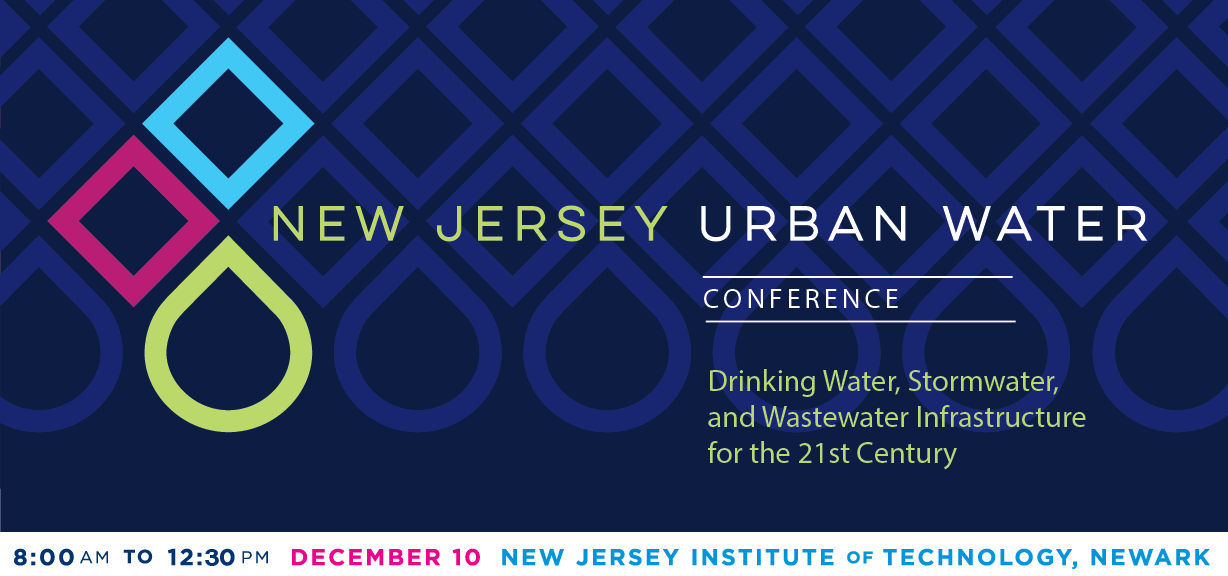New collaborative introduced; will focus on upgrading water infrastructure.
At the inaugural New Jersey Urban Water Conference on Dec. 10, speaker after speaker stressed the importance of water to healthy communities and economic vitality in New Jersey’s cities and towns, and cited numerous examples of how New Jersey’s inadequate water infrastructure threatens to hamper that vitality. Whether it’s a water-main break that prevents people from patronizing a restaurant, or rain-related flooding that keeps children away from school, it was clear that water management is both an economic-development problem and a neighborhood problem.
Much of the water infrastructure in New Jersey’s cities and towns is old and no longer adequate for the demands being placed on it, which means these places face the daunting challenge of finding ways to pay for necessary upgrades. In places like Camden, as Cooper’s Ferry Partnership Chief Executive Officer Anthony Perno pointed out, redevelopment projects can include water infrastructure improvements. And in many places, improving the efficiency with which water systems operate can reduce losses and realize cost savings.
See all photos from the conference
View the conference presentation
However, all speakers emphasized the need to ensure that consumers who use these water systems are well educated on the need for, and the benefits of, greater investment.
The conference opened with remarks from New Jersey Department of Environmental Protection Commissioner Robert Martin, followed by Joan Leary Matthews of the U.S. Environmental Protection Agency. Both speakers praised the 250 people in attendance for their commitment to the issue; emphasized the need to address urban water problems directly; encouraged those involved to think big about transformational solutions to the problem; and pledged their departments’ ongoing help and support.
Keynote speaker Radhika Fox, the chief executive officer of the U.S. Water Alliance, discussed the need to “change the mindset” around water, away from thinking about drinking water, stormwater and wastewater as three separate entities, and toward understanding the importance of capturing the full value of all water as an integrated asset. This means thinking of wastewater treatment in terms of what she called “resource recovery;” planning long-term and around watersheds; and ensuring that community benefits are maximized. She particularly highlighted the fact that most water-infrastructure management lacks a clear vision of a desired future state, and instead is managed almost exclusively by short-term crisis response. Water, she said, will be the defining issue for the next generation, and needs our boldest thinking.
The plenary session that followed highlighted strategies for realizing multiple benefits from water infrastructure upgrades. Session moderator Michele Siekerka, the president of the New Jersey Business & Industry Association, stressed the importance of thinking boldly and on a large scale. Albert Cho of Xylem Inc. highlighted the global intersection of water infrastructure and climate change, and talked about the potential for significant energy savings through maximizing efficiencies via the use of existing technologies. Michael Deane from the National Association of Water Companies reviewed the economic benefits of investing in water-infrastructure upgrades, via jobs created as well as direct financial investments, and pointed out the very real costs of not investing. Anthony Perno and Rahwa Girmatzion from PUSH Buffalo both underscored that resident involvement is key to guiding investments to where they will have the most impact, and only by ensuring that residents have a meaningful role in upgrading their water infrastructure will sufficient trust and support be generated.
The final session at the event featured three city mayors, discussing what they’ve done to ensure that their water infrastructure works for them, from working with local not-for-profits to be sure residents are fully informed and engaged to educating students in local schools, to working regionally to address regional challenges. For Hoboken Mayor Dawn Zimmer, “water infrastructure is the most important challenge facing our city,” citing the flooding impacts they hope to mitigate as they move forward with their Rebuild By Design project. Perth Amboy Mayor Wilda Diaz said her city is currently under a consent order, and encouraged others to work diligently to upgrade their systems so they were not put under the same restrictions. And Elizabeth Mayor Chris Bollwage finished by summarizing the challenge that any water investment efforts faces: “Water infrastructure is under the ground. It’s much easier to justify fixing a road because the problem is visible.”
